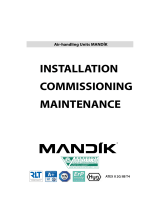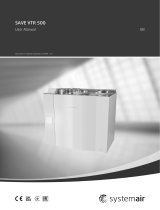
Automatic control system
– Control panel and external accessories
Performed Action
2.1 Control panel
2.2 Humidity sensor (bathroom/laundry
room)
2.3 Pressure relay (kitchen)
2.4 CO2 sensor (reception rooms)
2.5 Forcing switch (replace)
2.6 Other
Valves and ducts Performed Action Interval
3.1 Valves The supply air and extract air valves (for the
bathroom, bedroom, laundry room, etc.) must
be cleaned at least once a year. Dust around
supply air valves is best removed with a dry
cloth. Such dust is not due to faults/defects
ordirt in the supply air ducts.
Generally speaking, it is the usual dust found
in the home. The dust collects because of static
around the valve.
12
months
3.2 Air intake Check that no leaves or other items have caught
in the grille. In periods of sea smoke during
winter the air intake can freeze up.
If necessary, thegrille/air intake will have to be
de-iced/cleaned to allow air to ow freely again.
12
months
3.3 Roof cowl If the unit has a roof cowl, this must be
checked for leaves and the like.
Also check that the drain slots are open.
12
months
3.4 Ducts Check that the ducts are clean. 10 years
3.5 Dampers, if any Test moveable dampers and valves for correct
functioning.
Kitchen hood Performed Action Interval
4.1 Grease lter Kitchen hood*
Clean the grease lter. Check that the damper
is clean, and that it opens and closes (seals) as
it should.
2 weeks
*For units with extract air from the kitchen hood connected to the unit
Central vacuum cleaner Performed Action
5.1 Vacuum cleaner bag Change the vacuum cleaner bag.
5.2 Filter Clean the vacuum cleaner’s lter.
5.3 Connection Check that there is adequate suction at all points.
5.4 Vacuum cleaner hose Check the start/stop function.
Troubleshooting
Type of fault Performed Remedial action
6.1 Cold draughts Check which supply temperature has been selected.
See control panel.
Check that the rotor rotates.
Check that heating comes on.
New extract lter needed.
6.2 Fans not working Check that power is connected to the unit.
Check that the overheating thermostat has not cut out.
Reset the overheating thermostat if necessary.
Make sure that the unit has cooled down suciently.
Press the button that resets the unit’s thermostat.
Thenreset the alarm on the relevant control panel.
6.3 Low air ow rate Check what speed the unit is set to.
Check that the lters are tight.
Check the intake grille.









